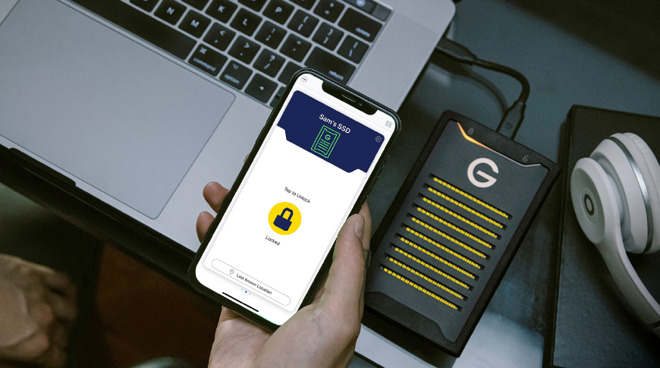Western Digital ArmorLock encrypted NVMe SSD offers ultimate protection without a password...
Western Digital's 2TB ArmorLock encrypted NVMe SSD allows users to ditch complicated or easily compromised passwords without compromising security.

ArmorLock encrypted NVMe SSD boasts read and write speeds of up to 1000MB/s via a SuperSpeed USB 10Gbps port. It supports both USB-C and USB-A connections and includes both cables in the box.
Additionally, it is rated with an IP67 dust and water resistance rating, up to nine feet of drop protection, and 1,000 pounds of crush resistance, making it safe to ship or take to job sites without fear of losing data.
The drive includes high-grade 255-bit AES-XTS hardware encryption and allows for a one-step erase and reformat to your preferred file system.
Users will no longer need to keep track of complicated passwords, either. The drive works with the ArmorLock app, allowing users to quickly lock and unlock the device wirelessly via their iPhone -- including support for both Touch ID and Face ID. The app also allows users to track the drive's last known location on a map.
For enterprise users, ArmorLock mobile and desktop apps allow fleet managers to configure and manage multiple drives. Managers will be able to easily grant and revoke access and set user permissions remotely, as well. This is especially useful for businesses that need to ship drives from one location to another.
The ArmorLock apps also receive regular updates for continued security, support, improvements, and new features, ensuring that the drive will continue to be as secure as the day it was purchased.
The ArmorLock encrypted NVMe SSD is available today for $599 and comes in a 2 terabyte configuration. The ArmorLock app for iOS and macOS is available for free and does not require a subscription.

ArmorLock encrypted NVMe SSD boasts read and write speeds of up to 1000MB/s via a SuperSpeed USB 10Gbps port. It supports both USB-C and USB-A connections and includes both cables in the box.
Additionally, it is rated with an IP67 dust and water resistance rating, up to nine feet of drop protection, and 1,000 pounds of crush resistance, making it safe to ship or take to job sites without fear of losing data.
The drive includes high-grade 255-bit AES-XTS hardware encryption and allows for a one-step erase and reformat to your preferred file system.
Users will no longer need to keep track of complicated passwords, either. The drive works with the ArmorLock app, allowing users to quickly lock and unlock the device wirelessly via their iPhone -- including support for both Touch ID and Face ID. The app also allows users to track the drive's last known location on a map.
For enterprise users, ArmorLock mobile and desktop apps allow fleet managers to configure and manage multiple drives. Managers will be able to easily grant and revoke access and set user permissions remotely, as well. This is especially useful for businesses that need to ship drives from one location to another.
The ArmorLock apps also receive regular updates for continued security, support, improvements, and new features, ensuring that the drive will continue to be as secure as the day it was purchased.
The ArmorLock encrypted NVMe SSD is available today for $599 and comes in a 2 terabyte configuration. The ArmorLock app for iOS and macOS is available for free and does not require a subscription.

Comments
I'll stick with encrypted APFS (configured using FileVault) instead of using a third-party encryption tool to manage its hardware encryption.
APFS encryption (FileVault) encrypts and decrypts when accessing the data. As long as the user is logged on, the data is accessible. When the user logs off or when the Mac is turned off, the data is not accessible. This encryption/decryption is handled by the Mac CPU (maybe T2 chip for external drives in the future?) and is extremely fast. I don't know how fast the hardware encryption/decryption is on the ArmorLock device but they limit the bus speed to USB-3 speeds. I know many NVMe blades can run significantly faster than this drive.
This drive is from G-Technology, hosted on the WD store. I presume WD builds the NVMe blade and G-Technology builds the enclosure.
"The ArmorLock encrypted NVMe SSD comes completely locked out of the box, shutting out access until the drive is unlocked with the app. Ejecting the drive automatically locks it - rendering all content inaccessible. ArmorLock is built with 256-bit AES-XTS hardware encryption and NIST P-256 elliptic curve-based key management for powerful data protection without compromising on speed." So the drive is only locked when you unlock it by the app and it stays unlocked while in use. I presume it automatically locks itself when it loses power.
"We’ve firstly made some big changes to get ready for the next major version of macOS 11.0 Big Sur, for both Hosts and Guests. With big changes happening at the deepest layers of the Mac Operating System, we’ve rearchitected our stack to take full advantage of Apple’s hypervisor APIs so that we no longer need kernel extensions to run Fusion on Mac making it more secure and ready for the future of macOS.
Fusion 12 will fully support macOS Catalina at launch, and is ready to support macOS Big Sur once it’s made generally available. On Catalina, it runs the same way it always has: with our kernel extensions. On Big Sur, it will run VMs, Containers and Kubernetes clusters by using Apple’s APIs."
So, you lose your phone and what happens?
The app is MacOS or iOS only, even though the drive works with Windows.